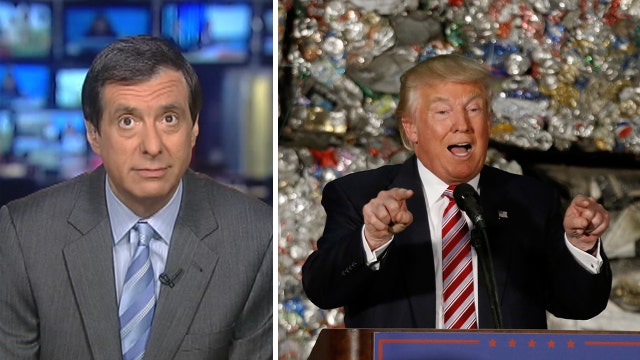Kurtz: Why Trump's 'Garbage' speech didn't stink
'MediaBuzz' host reacts to Donald Trump's trade speech and how he it succeeded in putting Hillary Clinton on the defensive
Donald Trump has broken with the Republican Party.
Not in terms of renouncing his party label. Not in terms of joint fundraising. Not in terms of the Cleveland convention, although many GOP luminaries will be staying away, including the only two living Republican ex-presidents.
No, Trump is parting company with decades of Republican religion on free trade—and that dramatizes how he is a different kind of nominee with an appeal to many working-class Democrats.
(And by the way, the new Quinnipiac poll showing him trailing Hillary Clinton by just 2 points may or may not be an outlier, but it has upset the conventional media wisdom that she has a huge lead and he’s hanging on by his fingernails.)
I’ve been arguing for a year that Trump is serving a mixed ideological buffet that includes some moderate and even liberal fare. This is why many traditional GOP conservatives oppose him, but it’s also why he exerts a strong pull on white working-class Democrats. And it’s why Trump has been openly urging Bernie Sanders supporters to get behind him.
It’s certainly not because of his stance on social issues. The Supreme Court disappointed conservatives this week by striking down a Texas law that had forced many of the state’s abortion clinics to close, and the Trump campaign made no comment.
Trump has also taken the classic Democratic stance on making no changes to Social Security and Medicare, despite growing concern that these entitlement programs eventually face insolvency.
But trade is emerging as one of Trump’s signature issues. He has always hit hard against trade with China, but he tied together many economic threads in a scripted speech this week, denouncing global trade as “a rape of our country.” And the media sat up and took notice.
Politico’s lead: “Donald Trump doubled down on economic populism and protectionism in a speech Tuesday, effectively taking conservative orthodoxy on free trade and tossing it onto the trash pile rising behind him.”
The Washington Post put it this way: “Donald Trump on Tuesday channeled more than a year’s worth of fiery and freewheeling protectionist rhetoric into an uncharacteristically disciplined address, putting him out of step with decades of conservative economic orthodoxy and even some of his own prior positions.”
Among other things, Trump challenged Clinton to oppose passage of the Trans-Pacific Partnership in any form—a point reinforced in an email to reporters yesterday: “Clinton now weakly says she only has issues with the TPP ‘currently...in its current form,’ politician-speak for saying she will approve it at the very earliest opportunity.”
This is a strong issue for Trump for a variety of reasons. A good chunk of the American public believes we’re getting screwed by bad trade deals. Unlike on other issues, such as abortion, Trump has been consistent on the subject, even criticizing Japanese trade back in the 1980s. “They dump the cars and the VCRs and everything else,” he told David Letterman.
And it is a prickly issue for Clinton. Her husband pushed through NAFTA back in 1993—with the help, it is often forgotten, of many congressional Republicans. Clinton strongly supported the TPP as secretary of State. And yet, under pressure from Sanders, she backed away from that trade pact during the primaries, expressing various reservations without totally abandoning it.
The Democrats, who champion labor unions, have always been conflicted on trade, since it costs some of their supporters jobs as factories and production move abroad. But the Republicans have been staunch supporters of free trade, as Mitt Romney was in 2012. And that’s why the Chamber of Commerce immediately criticized Trump’s speech, insisting that “contrary to rumor, the benefits of trade greatly outweigh the costs.”
Donald Trump is not a Chamber of Commerce Republican. That should be clear by now. His stances on immigration and terrorism tend to be divisive, but his position on trade reinforces his argument that the system is rigged against average Americans.
The media seemed mainly amused by the fact that Trump delivered his speech in front of a wall of garbage. But this is far from a garbage issue for his campaign.













































